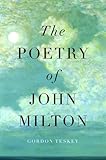The Poetry of John Milton /Gordon Teskey.
Material type: TextPublication details: Cambridge, Massachusetts : Harvard University Press, (c)2015.Description: 1 online resource (xvii, 619 pages)Content type:
TextPublication details: Cambridge, Massachusetts : Harvard University Press, (c)2015.Description: 1 online resource (xvii, 619 pages)Content type: - text
- computer
- online resource
- 9780674286740
- PR3553 .P648 2015
- COPYRIGHT NOT covered - Click this link to request copyright permission: https://lib.ciu.edu/copyright-request-form
| Item type | Current library | Collection | Call number | URL | Status | Date due | Barcode | |
|---|---|---|---|---|---|---|---|---|
 Online Book (LOGIN USING YOUR MY CIU LOGIN AND PASSWORD)
Online Book (LOGIN USING YOUR MY CIU LOGIN AND PASSWORD)
|
G. Allen Fleece Library ONLINE | Non-fiction | PR3553 (Browse shelf(Opens below)) | Link to resource | Available | ocn911266564 |
Includes bibliographies and index.
Part I: Transcendence. On the early poems ; On "L'Allegro" and "Il Penseroso" ; On the work not called Comus ; On engagement in A Masque ; On "Lycidas" as primitive art -- Part II: Engagement. On the interstitial Latin poems and an English fragment ; On the sonnets and shorter poems of the political period ; On the romantics and the principles of Milton -- Part III: Transcendental engagement. On history in Paradise Lost ; On the origin in Paradise Lost ; On the verse of Paradise Lost ; On the sublime in Paradise Lost ; On temptation in Paradise Lost ; On the end in Paradise Lost ; On late style in Paradise Regained and Samson Agonistes -- Appendix I: References and texts -- Appendix II: Chronology of the poems.
"John Milton is regarded as the greatest English poet after Shakespeare. Yet for sublimity and philosophical grandeur, Milton stands almost alone in world literature. His peers are Homer, Virgil, Dante, Wordsworth, and Goethe: poets who achieve a total ethical and spiritual vision of the world. In this panoramic interpretation, the distinguished Milton scholar Gordon Teskey shows how the poet's changing commitments are subordinated to an aesthetic that joins beauty to truth and value to ethics. The art of poetry is rediscovered by Milton as a way of thinking in the world as it is, and for the world as it can be. Milton's early poems include the heroic Nativity Ode; the seductive paired poems "L'Allegro" and "Il Penseroso"; the mythological pageant Comus, with its comically diabolical enchanter and its serious debate on the human use of nature; and "Lycidas," perhaps the greatest short poem in English and a prophecy of vast human displacements in the modern world. Teskey follows Milton's creative development in three phases, from the idealistic transcendence of the poems written in his twenties to the political engagement of the gritty, hard-hitting poems of his middle years. The third phase is that of "transcendental engagement," in the heaven-storming epic Paradise Lost, and the great works that followed it: the intense intellectual debate Paradise Regained, and the tragedy Samson Agonistes."--Publisher's description.
COPYRIGHT NOT covered - Click this link to request copyright permission:
There are no comments on this title.
